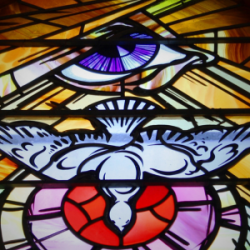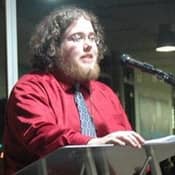We sat in the wet heat of a St. Louis summer, eating ice cream and drinking sodas outside of the Southern Commercial Bank on Meramec Street. My father had picked up my cousin, Megan, and me from his sister's house and stopped by a gas station for payday treats; he had just finished putting up a fence for a local land-baron, and we were going to the movies after he cashed his check. He took in a big yawn and stretched, tired after working all week, and looked over at us with a smile.
Megan and I were 7 or 8 at this point, both chubby, ferociously blond children. I remember looking out the window at the neighborhood around the bank—brick houses, like almost everywhere in St. Louis, and a big Catholic church down the block. I finished my ice cream and looked at my father, and asked him a question in my high, innocent voice.
"Hey dad," I said, "are we Christians?"
I don't know why I asked him that question. Maybe it was the church down the street; more likely, it was the fairly constant stream of low Protestant rhetoric I heard from my aunt while she babysat me. I don't think I understood any of it beyond knowing that I wasn't supposed to say "Jesus!" out loud when I hurt myself, the way my grandfather sometimes did, and that apparently God had created "Adam and Eve, not Adam and Steve." (The fact that I was a prepubescent homophobe still gives me chills.) I'm sure I expected it to be a very simple question, the kind children ask not out of curiosity, but for reassurance. "Are we Christians?" Of course we were. Who wasn't?
My father hesitated. Even at that age, I knew that my dad wasn't the kind of person who hesitated often. He's a stout, bearded man, and has curly brown hair that he wears long as repayment for a childhood of crew-cuts. He was a working man, a carpenter, and had been for his whole life, and his voice and personality have been colored by that. He was the sort of person who tells jokes to strangers and could tell just how dirty to make them by instinct. Gregarious, outspoken, a little temperamental: you could describe my father with words like these. But not shy. Not hesitant. Not usually.
Megan and I looked at him, waiting for an answer. He looked at me, and then he glanced at her, and he sighed.
"Well, son, I've never been much on church-going," he said. "But yeah, I guess we are."
I smiled and clapped my hands on the cracked pleather seats of the truck bench. Order had been restored to the world. "Great!" I cried. "Then we're all Christians." Megan nodded and kept eating her ice cream. Eventually, Dad took us in and cashed the check, and we went to the movies—what we saw, I don't remember.
I have a friend—also named Megan—who has a simply incredible memory. She remembers the first day we met, down to the date. She remembers every time I've said something that offended her, every friend she's ever had, and every party ever thrown. My memory isn't like that at all. I mostly see gray murk when I think of my life before the age of 10 or so.
But I remember those few minutes, sitting in my dad's khaki-tan pickup truck, perfectly, along with a handful of other unthinking childhood sins. It haunts me, because I realize now how hard that question must have been, and how much it must have hurt my dad when I asked it.
Dad had lied, of course.
We weren't Christians. He hadn't been one for nearly two decades, and I had never been one at all. My dad had become an apostate as a teenager, and found his way—somehow—into ceremonial magick and eventually Thelema and Wicca and a dozen other schools of the occult by the time he was in his 20s. My parents were the priest and priestess of Coven Pleiades by the time they had me, and twice a month, our house filled up for rituals and discussions and parties. Once every six weeks we traveled—sometimes across the city, sometimes across the state—for the sabbats. By the age of 8, I must had stood in at least a hundred and twenty circles, following the adults as they called in the elements and passed chalices of wine that I generally considered too disgusting to share.
But I didn't know what any of that meant, or what it signified about who I was. I knew what "circle" was, and I knew the rules about how to act when we did one, but I didn't know that it was religion. Maybe my dad would have explained all that to me had we been alone, had the daughter of his loudly Christian (though, notably, no more churchgoing) sister not been in the truck with us. I don't know.
I always think of this story when someone asks me what it was like to grow up as a second-generation Pagan. A lot of it was confusing—identity games and standing secrets that I couldn't really understand as a child, and had to negotiate as a teenager and an adult. I never had a point where my eyes opened and I understood, "oh, I've been a Pagan all this time," although I understand many who convert to Paganism have exactly that experience. It's always been gradual for me, a process that has involved misunderstanding, denial, and doubt—and, thankfully, some joy and acceptance, too.





